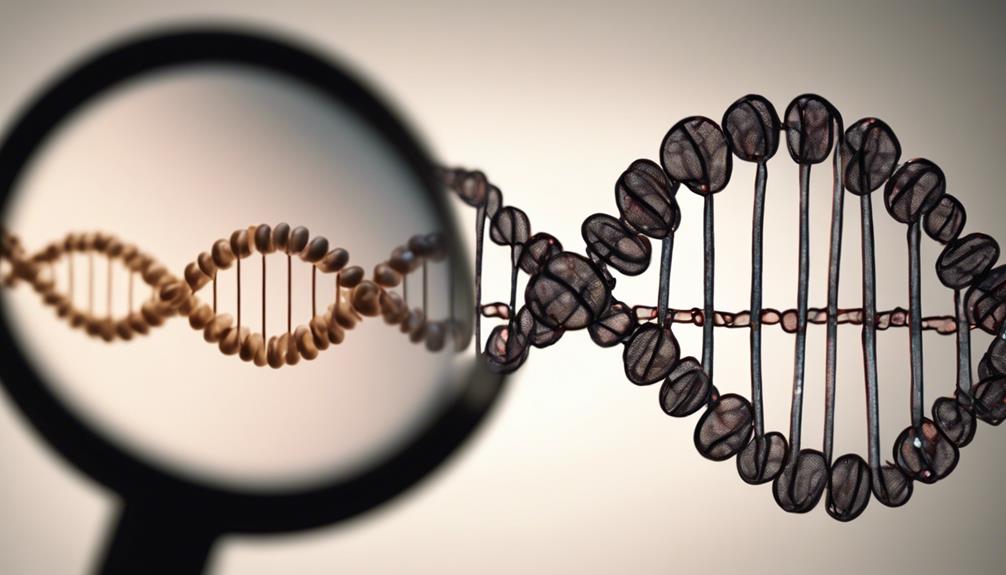Narcissistic Personality Disorder (NPD) shows a clear genetic link, with genetic factors contributing to 33% to over 50% of its heritability. This indicates a genetic predisposition to narcissistic traits influenced by specific genes. Twin studies emphasize that over 50% of the risk for NPD is genetic. By understanding these genetic influences, we gain insights into the origins of narcissistic behaviors. Genetic research helps diagnose and treat NPD more effectively by considering these hereditary components. Exploring the genetic basis of NPD can provide a deeper understanding of its complexities and inform strategies for managing this condition effectively. For more insights into NPD causes, keep investigating.
Key Takeaways
- NPD has a heritability ranging from 33% to over 50%.
- Twin studies indicate a risk of inheriting narcissism exceeding 50%.
- Genetic factors predispose individuals to narcissistic traits.
- Specific genes play a pivotal role in narcissistic behaviors.
- Understanding heritability is crucial for diagnosing and treating NPD.
Understanding Narcissistic Personality Disorder Genetics
Understanding the genetic underpinnings of Narcissistic Personality Disorder is vital in identifying inherited predispositions to narcissistic traits. Research has shown that NPD has a genetic component, with heritability estimates ranging from 33% to over 50%.
Certain genes may predispose individuals to the narcissistic personality traits associated with NPD. Twin studies have been instrumental in evaluating the genetic influence on the development of NPD. In fact, genetic influences on NPD can account for over 50% of the risk of inheriting narcissistic traits.
By delving into the genetic basis of NPD, we can enhance our ability to diagnose and treat individuals exhibiting narcissistic personality traits. This understanding not only sheds light on the origins of such traits but also paves the way for more effective interventions and support strategies for those affected by NPD.
Genetics plays a significant role in shaping the landscape of narcissistic traits, and by unraveling these genetic mysteries, we move closer to a more thorough understanding of Narcissistic Personality Disorder.
Genetic Predisposition and Narcissism

Studies have highlighted the genetic predisposition for narcissism, indicating a significant heritability rate ranging from 33% to over 50%. This means that certain genes may predispose individuals to develop narcissistic personality traits.
Twin studies have further reinforced this notion by showing that the risk of inheriting narcissism can be over 50%. Genetic influences play an essential role in the development of narcissistic personality disorder (NPD), particularly within Cluster B personality disorders.
These genetic factors contribute to the entitlement and grandiosity traits commonly associated with narcissism. Understanding the genetic component of narcissism can provide insights into how personality traits are inherited and expressed. It underscores the importance of considering genetic predispositions when studying narcissistic behaviors and their impact on individuals.
The interplay between genes and personality traits like entitlement and grandiosity sheds light on the complex nature of narcissistic tendencies and their origins.
Environmental Factors and NPD

Environmental factors, such as upbringing and trauma, play a significant role in the development of Narcissistic Personality Disorder (NPD).
The way individuals are raised and the experiences they endure during childhood can shape their narcissistic tendencies.
Understanding these environmental influences is vital in comprehending the complexities of NPD.
Role of Upbringing
Our upbringing significantly influences the development of narcissistic traits in individuals, with indulgent parenting and permissiveness being recognized as contributing factors. Understanding the impact of environmental factors, such as different parenting styles, is essential in comprehending the development of Narcissistic Personality Disorder (NPD). Here is a table outlining the role of upbringing in shaping narcissistic behaviors:
| Environmental Factors | Impact on NPD Development |
|---|---|
| Indulgent Parenting | Can foster entitlement and lack of empathy. |
| Permissive Environment | May lead to an inflated sense of self-importance. |
| Overvaluing Behavior | Could contribute to a grandiose self-image. |
| Cold Parenting Style | Might result in difficulties in forming healthy relationships. |
| Neglectful Environment | Can lead to a fragile self-esteem and need for constant admiration. |
Impact of Trauma
Experiencing trauma, whether through neglect or abuse, can greatly shape the development of Narcissistic Personality Disorder (NPD). When it comes to the impact of trauma on NPD, several key points emerge:
- Environmental influences, such as dysfunctional family dynamics, can contribute to the manifestation of NPD.
- Individuals with NPD may utilize narcissism as a defense mechanism against feelings of shame and inadequacy resulting from past trauma.
- Childhood experiences of neglect or abuse play a significant role in shaping narcissistic traits in individuals with NPD.
- Adverse childhood events, including trauma, are pivotal in the development of narcissistic tendencies in individuals.
Understanding how trauma interacts with hereditary factors and environmental influences sheds light on the complex nature of NPD development.
Genetic Vs. Environmental Influence

How do genetic factors contribute to the development of narcissistic traits compared to environmental influences?
Genetics play a significant role in shaping narcissistic personality traits. Studies have shown that there's a heritability component to narcissism, with estimates ranging from 33% to over 50%. This suggests that a portion of narcissistic tendencies can be attributed to genetic factors passed down through generations.
On the other hand, environmental influences also play an important role in the development of narcissistic traits. Factors such as parenting styles, societal norms, and life experiences can all impact how narcissistic tendencies manifest in individuals. Additionally, neurobiological factors, including differences in nervous system functioning, may also contribute to the expression of narcissism.
Understanding the interplay between genetics, environment, and neurobiology is essential in thoroughly evaluating and addressing narcissistic traits. By considering both genetic and environmental influences, clinicians and researchers can gain a more holistic understanding of narcissistic personality disorder and tailor interventions accordingly.
Inheritance of Narcissistic Traits

Studying the genetic predispositions for narcissistic traits sheds light on the hereditary factors influencing their development. When it comes to the inheritance of narcissistic traits, several key points emerge from behavioral genetic studies:
- Genetics in Narcissistic Personality: Research suggests that narcissism has a genetic component, with heritability estimates ranging from 33% to over 50%. This indicates a significant genetic effect on the development of narcissistic traits.
- Types of Narcissism: Certain genes may predispose individuals to exhibit specific types of narcissism, such as grandiose or vulnerable narcissism. Understanding the genetic basis for these variations is essential.
- Environmental Bases of Two: While genetics play an important role, environmental factors, like parenting styles, also contribute to the development of narcissistic traits. The interplay between genetic and environmental influences is complex and worth exploring further.
- Genetic Factor: Twin studies have shown that the risk of inheriting narcissism can be substantial, emphasizing the importance of considering the genetic factor in understanding the inheritance of narcissistic traits.
Genetic Research on NPD

Genetic research on Narcissistic Personality Disorder (NPD) reveals a significant hereditary component influencing its development. Studies have shown a strong heritability of NPD within Cluster B personality disorders, with genetic factors playing a pivotal role in shaping traits like entitlement and grandiosity.
While genetic influences contribute to the predisposition for narcissistic traits, it's essential to note that they aren't the sole cause. Environmental factors such as societal norms, cultural influences, parent-child relationships, and traumatic experiences also play an important role in the development of NPD.
Certain genes may create a susceptibility to developing narcissistic traits, but how these genes interact with one's environment is equally significant. Understanding the genetic influences on NPD offers valuable insights into the complexities of this personality disorder.
Moving forward, exploring how genetic predispositions interact with environmental factors will provide a more thorough understanding of the hereditary aspects of narcissism.
Impact of Genetic Factors

The influence of genetic factors on narcissistic personality traits is substantial and well-documented. When exploring the impact of genetic factors on narcissism, several key points emerge:
- The Narcissistic Grandiosity Scale is often used to measure intrapersonal grandiosity and interpersonal entitlement in individuals, shedding light on the genetic influence behind these traits.
- Research indicates that specific genes may play a role in predisposing individuals to exhibit narcissistic behaviors, further highlighting the genetic underpinnings of narcissism.
- Twin studies have been instrumental in understanding the heritability of narcissistic traits, with findings suggesting a significant genetic component in the development of narcissistic personality disorder.
- Recognizing the genetic influence on narcissism is vital in diagnosing and treating individuals with narcissistic personality traits, emphasizing the importance of considering genetic factors in therapeutic interventions and interventions.
Heritability of NPD

Our investigation into the heritability of Narcissistic Personality Disorder reveals compelling evidence of a significant genetic predisposition for this condition. Studies have shown that NPD has a heritability ranging from 33% to over 50%, indicating a significant genetic influence on the development of narcissistic traits. Twin studies, in particular, have demonstrated that the risk of inheriting narcissism can be over 50%, further underscoring the role of genetics in this personality disorder.
Genetic factors may predispose individuals to exhibit narcissistic personality traits, with specific genes potentially playing a pivotal role in the manifestation of narcissistic behaviors. Understanding the heritability of NPD is essential for diagnosing and devising effective treatment strategies for individuals affected by this disorder. By acknowledging the genetic component of NPD, mental health professionals can better tailor interventions to address the underlying biological influences contributing to narcissistic tendencies. The complexity of genetic contributions to NPD underscores the importance of continued research in unraveling the intricate relationship between genetics and personality disorders.
Frequently Asked Questions
Is Narcissistic Personality Disorder Hereditary?
Yes, narcissistic personality disorder (NPD) can be hereditary. Research suggests a genetic component with heritability estimates ranging from 33% to over 50%.
Studies indicate specific genes may predispose individuals to narcissistic traits, increasing the risk of developing NPD. Twin studies have shown a significant genetic influence on NPD inheritance.
Genetic factors impact both grandiose and vulnerable narcissism types, though environmental influences also play a critical role in the disorder's development.
What Is the Root of Narcissism?
The root of narcissism lies in a complex interplay of genetic predispositions, environmental influences, and early life experiences.
Our genetic makeup, including specific genes linked to narcissistic traits, can set the stage for developing narcissistic tendencies.
However, factors such as upbringing and relationships also play vital roles in shaping these traits.
Understanding this intricate web of influences can provide valuable insights into the origins of narcissism.
At What Age Does Narcissistic Personality Disorder Develop?
Narcissistic Personality Disorder typically develops in the late teens or early adulthood. Early signs can be observed in childhood but may not fully manifest until later. The exact age of onset varies among individuals.
Diagnosis is based on specific criteria and behaviors. It's important to be aware of these patterns and seek professional help if needed. Early intervention and support can make a significant difference in managing NPD effectively.
Is Narcissism Passed Down From Parents?
Narcissism can indeed be passed down from parents. Genetic factors play a significant role in the hereditary nature of narcissistic personality traits. Studies suggest that certain genes may predispose individuals to narcissism, contributing to its inheritance.
However, environmental factors like parenting styles also influence the development of narcissistic tendencies. Understanding the complex interplay between genetics and environment is key to comprehending the hereditary aspects of narcissistic personality disorder.
Conclusion
To sum up, while research suggests a genetic link to narcissistic personality disorder, it's important to remember that environmental factors also play a significant role in shaping personality traits.
Understanding the interplay between genetics and environment can help individuals navigate their own predispositions and make informed choices about their behaviors.
By recognizing the influence of both nature and nurture, we can work towards promoting healthier relationships and personal growth.
Remember, knowledge is power when it comes to understanding the complexity of human behavior.










